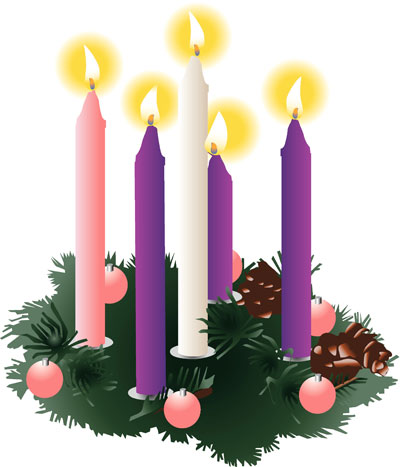 Advent (the name means ‘coming’) is the start of the church’s year and runs from the Sunday that falls on or closest to the 30th of November. It ends with the first evening prayer of Christmas. It is a season of reflection and preparation, of hope and anticipation as we wait for the coming of Christ - at Christmas, at the end of our lives and at the end of time. Although the ‘Gloria’ is omitted, Advent is less severe than Lent: flowers can still decorate the church (in moderation), music, although reduced, is allowed and the Gospel acclamation still includes the word ‘alleluia’. “...Advent is a season of devout and joyful expectation.”
Advent (the name means ‘coming’) is the start of the church’s year and runs from the Sunday that falls on or closest to the 30th of November. It ends with the first evening prayer of Christmas. It is a season of reflection and preparation, of hope and anticipation as we wait for the coming of Christ - at Christmas, at the end of our lives and at the end of time. Although the ‘Gloria’ is omitted, Advent is less severe than Lent: flowers can still decorate the church (in moderation), music, although reduced, is allowed and the Gospel acclamation still includes the word ‘alleluia’. “...Advent is a season of devout and joyful expectation.”
There are always four Sundays in Advent regardless of what day of the week Christmas Day falls on. The third is known as Gaudete Sunday and rose vestments may be worn – otherwise the colour is purple.
The origins of Advent go back to the early centuries of the church. In Spain and Gaul (modern France) a period of fast was observed before the Feat of the Epiphany (6th January) the original feast of Christ’s birth and an important date for Baptisms. By the end of the fifth century we have the first written evidence of Advent as a time of preparation. By the middle of the sixth century the beginnings of an Advent liturgy can be seen in Rome. By the time of Pope Gregory the Great (590-604) the four Sundays of Advent are being celebrated. This was not universal and the length of Advent could vary from diocese to diocese – Milan still celebrates Advent with six Sundays. We owe the omission of the Gloria, something of its penitential character and the purple vestments to the influence from Gaul on the Roman liturgy in the twelfth century.
The Gloria, “... is not omitted for the same reason as it is omitted in Lent, but in order that on the night of Christmas the angels’ song may ring out once again in all its newness.”